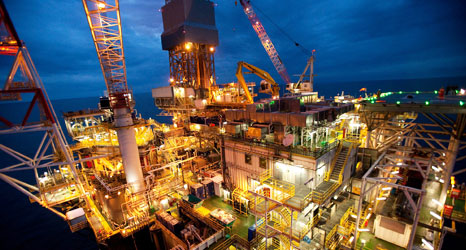
European Companies Contracting to Buy Azerbaijani Gas
Publication: Eurasia Daily Monitor Volume: 10 Issue: 170
By:

On September 19, in Baku, nine European energy companies signed contracts to purchase Azerbaijani natural gas from the Shah Deniz field, Phase Two of production.
All nine contracts cover a period of 25 years, starting with the first gas flow into Europe from the Azerbaijani-led Trans-Anatolia Pipeline (TANAP), feeding into the planned Trans-Adriatic Pipeline (TAP) toward Italy and onward into Western Europe. The first gas flow into Europe is projected for 2019. All buyers have contracted for fixed annual gas volumes that will remain constant during the contract period.
Gaz de France will buy a total of 65 billion cubic meters (bcm), at an annual rate of 2.6 bcm during the contract period. The German E.ON Ruhrgas will purchase 40 bcm, at a rate of 1.6 bcm per year during that same period. Gas Natural Fenosa of Spain will procure 25 bcm, at an annual rate of 1 bcm in the same time frame. Bulgaria’s Bulgargaz will also purchase 25 bcm at a rate of 1 bcm per year during the contract period. The Italian Hera Trading (part of the Hera Group of municipal energy utilities) will buy 7.5 bcm, at a rate of 300 million cubic meters per year. (Gaz de France, E.ON Ruhrgas, Gas Natural Fenosa press releases, September 23, cited by Trend, September 23; Novinite [Sofia], September 19).
Royal Dutch Shell, Axpo Holding of Switzerland (energy utilities of six Swiss cantons), the Italian ENEL (Ente Nazionale per l’Energia Elettrica, national electricity champion, partly state-owned), and Greece’s DEPA (Natural Gas Public Corporation, in charge of procurement and supply) have also signed the 25-year contracts. Their procurement volumes have not yet been announced.
The multinational consortium of Shah Deniz producers is a party to each contract as the gas supplier. The contracts will enter into force upon the adoption of the final investment decision (FDI) by the Shah Deniz consortium to develop Phase Two of production. According to Azerbaijan’s State Oil Company (SOCAR) president, Rovnag Abdullayev, total revenues from these supply contracts are anticipated at $200 billion on preliminary estimates (Trend, September 19).
Multiplicity of buyers is the most salient characteristic of this commercial arrangement. It corresponds with Azerbaijan’s preference for apportioning gas volumes among a wide range of customers along the designated route, carving out market niches on long-term contracts. Such a strategy mitigates risks, enhances security of demand, and avoids competing volume-to-volume against bigger suppliers. Thanks to the TANAP pipeline project, initiated and majority-owned by Azerbaijan, the country is physically connecting with the customer countries in the European Union.
Those nine companies have been selected from among 15 European companies that had proposed earlier this year to buy gas volumes from the Shah Deniz Phase Two project. Reflecting robust, long-term gas demand in Europe, those proposals totaled at least twice as much as the anticipated production of Phase Two.
Shah Deniz Phase Two will produce 16 bcm per year on average, reaching the plateau at that level by 2022 as currently anticipated. Of that amount, 6 bcm per year are set aside to supply Turkey from 2018 onward, and another 10 bcm are now contracted to European companies from 2019 onward (contingent on the Shah Deniz FDI—see above). Shah Deniz holds 2.1 trillion cubic meters in proven reserves (not including deeper levels with probable reserves). The Shah Deniz project’s lifetime runs until 2036. Additional export volumes are expected from Azerbaijani gas fields other than Shah Deniz. Those should come on stream after 2020, which will necessitate capacity increases in the TANAP and TAP pipelines to handle those new volumes. Gas supply from Turkmenistan remains a distinct possibility; that from Iraq’s Kurdish region, however, seems a longer shot.
SOCAR considers the possibility of undertaking the “gasification” of Albania (introducing gas usage for the first time in that country, supplying the volumes, and building a distribution grid). The Albanian government welcomes the prospect enthusiastically. This has become possible as a collateral effect of the planned TAP pipeline, which will cross Greece and Albania en route to Italy. SOCAR has recently acquired a minority ownership stake in TAP (as have other Shah Deniz gas producers). But gasification of Albania does not necessarily depend on TAP, since SOCAR has recently won the tender for 66 percent ownership of Greece’s DESFA (Public Gas Transmission System Operator) and could build a branch-off line from the Greek pipeline system into Albania if warranted.
Current plans envisage the following timeline for implementing this vast project in all its components:
Shah Deniz Phase Two: final investment decision by the end of 2013; start of construction work in the second half of 2014 at the field; first export flow in 2018 to Turkey and 2019 to Europe.
Trans-Anatolia Pipeline (Georgia-Turkey border to Turkey-Greece border): start of construction expected in 2014 for completion by 2018. Information on the planned expansion of the pipeline through Georgia seems difficult to obtain in the public domain.
TAP pipeline (Greece-Albania-Italy): start of construction work in 2015 for completion by 2019.




